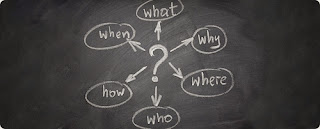What Do We Need to Know About Asking Questions to be an Effective Teacher?
Principal Ben Johnson tells the truth no teacher wants to admit, students do not always listen or pay attention. He says throughout his observations he noticed some children never answered even one question they just waited for others to do it for them. Therefore, we must get creative with our questioning process. Ben Johnson's blog says an effective method he researched was on of Mary Budd Rowe. She recommends asking a question and waiting three seconds to call a student's name to answer. She says this gives students time to think about the answer, and nothing else. I believe this would be an effective way of questioning because then the students would be trying to figure out the answer instead of looking around the room for other hands, or hoping not to be called on. Also, the random names will help keep students focused and ready to answer, if called upon.
Right Way to Ask Questions
Asking Questions to Improve Learning
One point that stuck out to me in this article was that teachers should avoid asking questions that could have the answer within them. As a student, I am guilty of favoring these questions on tests. I know they hinder my learning though because I don't retain that information. I am too concerned with knowing I got at least that one right. If students don't have to actually learn the material to pass, they won't. These days students get so consumed with passing they forget the whole purpose of school is learning and building skills for their future. As a teacher, I hope to stay away from these questions so I can ensure my students will remember what school is for.
Asking Questions to Improve Learning
Three Ways to Ask Better Questions in the Classroom
Maryellen Weimer's first point says to, "Prepare questions". I believe this will be the most helpful in my teaching. Preparing questions before class will help me ensure I am asking and or teaching the right things. By preparing questions early, I can look them over and make changes, or omit some if I feel they don't help the lesson. Having questions prepared, I can spend more time focusing on my students and ensuring they are paying attention and truly understanding the lesson. If we already know the questions, then there should be no confusion on what we are teaching and what we hope the students will learn. Her second point "Play with questions," gives the idea of keeping a question unanswered for a little while to keep the thinking process going. This could be helpful for discussions. Giving the students time to think more into their answers could bring up better and longer discussions. The final point given was, "Preserve good questions," meaning save some questions that were asked, to help. She says it also shows that the teacher remembered and took into account what the students say and do.
Three Ways to Ask Better Questions
Asking Better Questions
This video discusses the difference in close ended questions and open ended questions, and how they effect the learning. She says open ended questions are more challenging and require more thinking, but give so much more on the information. Close ended questions stop the students at yes or no and requires no more thinking than that. Open ended questions require students to think and tell more about their answers and beliefs. The example she gives is a questions about Rosa Parks and her effects on society after refusing to give up her seat. Keeping this question open ended allows for many more answers and discussions to come about. Learning is not just about what the teachers have to say and offer, but also about the surroundings and students' offerings.
Asking Better Questions

Tiffany,
ReplyDeleteI am very impressed with your blog, and love how organized you are. In your paragraph titled "Asking Questions to Improve Learning" I would agree with you completely that today in schools it is more about passing than having the student learn the material. I also hope to steer my students away from this kind of learning, and hope that they grasp more knowledge and that all starts with the teachers asking the right questions.
Thank you both!
ReplyDelete